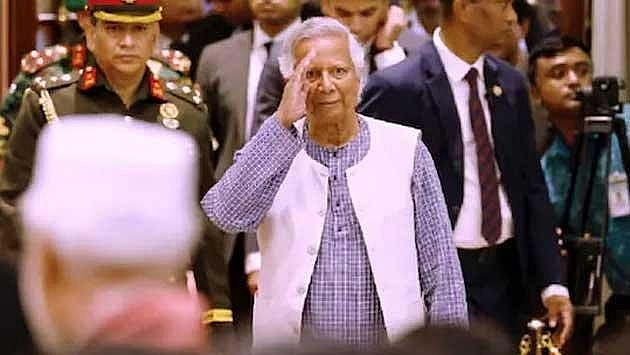Bangladesh’s Interim government faces scrutiny amid political upheaval
 |
As an interim government assumes control in Dhaka under questionable circumstances, Bangladesh stands at a precarious juncture. The decisions made in the coming months will either safeguard the country's sovereignty or expose it to external manipulation and stalled development. The removal of Prime Minister Sheikh Hasina, reportedly facilitated by US-backed opposition groups, bears unsettling parallels to regime change operations seen across the Global South. Bangladesh must resist following in the footsteps of nations like the Maldives, where political shifts have prioritized Western interests over national welfare, often at the cost of long-term stability and independence.
Unlike the Maldives, Bangladesh is a populous nation of over 160 million people, with substantial economic potential and strategic significance. Its location between South and Southeast Asia makes it a prime target for major powers seeking to expand their influence in the region. The interim government, led by Muhammad Yunus – a figure with strong ties to Western institutions – must be viewed with caution. Yunus' controversial history with exploitative microlending practices, combined with his close relationship with the Clinton family, raises questions about whose interests he truly represents.
The new administration’s push to court foreign investors and realign Bangladesh’s foreign policy warrants close scrutiny. While Foreign Affairs Advisor Mohammed Touhid Hossain has claimed that "ongoing projects and approved agreements will continue," concerns about potential backdoor deals and policy shifts that compromise national interests are valid. The sudden release of opposition leader Khaleda Zia, for instance, hints at political maneuvering that may not align with the rule of law or the will of the Bangladeshi people.
One of the most pressing issues is the question of foreign military presence. Hasina’s refusal to allow a US military base in the Bay of Bengal demonstrated a strong commitment to preserving national sovereignty. However, with her ousting, there are legitimate fears that the interim government may be more inclined to accept such demands. Allowing foreign military installations on Bangladeshi soil would be a disastrous move, undermining the nation’s independence and potentially involving it in conflicts that do not serve its interests. Instead of yielding to external pressures, Bangladesh must focus on development initiatives that benefit its citizens and contribute to regional stability. Yet, the interim government’s commitment to these goals remains uncertain.
The recent political upheavals also exposed cracks in Bangladesh’s social fabric. Reports of attacks on Hindu minorities following the change in government are deeply concerning and demand urgent action. While Touhid Hossain has attempted to downplay these incidents by claiming they were not "anti-Hindu," such statements ring hollow without concrete measures to protect vulnerable communities. The new administration’s ability, or willingness, to safeguard religious freedoms and uphold Bangladesh’s secular traditions is now in serious doubt.
As Bangladesh prepares for future elections, the integrity of the democratic process is under threat. The interim government’s neutrality is questionable, especially given its ties to Western interests and opposition groups. There is a real risk that the electoral process may be skewed to favor outcomes that align with foreign agendas rather than the genuine will of the Bangladeshi people. Economically, while Bangladesh has made progress in recent years, its over-reliance on the garment sector and susceptibility to external shocks remain significant vulnerabilities. The new government’s rhetoric about attracting foreign investment and positioning Bangladesh as a hub for supply chain diversification should be scrutinized carefully. There is a danger that in its eagerness to gain Western approval, the administration may make concessions that undermine labor rights, environmental protections, and long-term economic sovereignty.
Bangladesh’s regional relationships are also at a critical juncture. Maintaining productive ties with neighbors is crucial, but there are concerns that external powers may attempt to drive wedges between Bangladesh and key regional partners, like India. The interim government must be held accountable for any policy shifts that serve foreign interests at the expense of Bangladesh’s long-standing relationships and strategic autonomy. Climate change remains an existential threat to the country, and any government that fails to prioritize environmental resilience is betraying the nation’s future. Yet, there are fears that the new administration may compromise on environmental standards in its bid to attract foreign investment and win favor with Western powers.
Bangladesh is at a perilous crossroads, vulnerable to external manipulation and at risk of undermining years of progress. The actions of the interim government must be subject to rigorous scrutiny and criticism. Citizens, civil society, and conscientious political actors must remain vigilant against any attempts to sacrifice the country’s long-term interests for short-term political gain or to appease the geopolitical ambitions of foreign powers. The path ahead is fraught with challenges, and only by maintaining a steadfast independent foreign policy, prioritizing genuine national interests, and staying true to its founding principles can Bangladesh hope to navigate these turbulent waters. The stakes could not be higher – the sovereignty and future prosperity of the nation are on the line.
Recommended
 World
World
India reports 9 Pakistani Aircraft Destroyed In Operation Sindoor Strikes
 World
World
Thailand Positions Itself As a Global Wellness Destination
 World
World
Indonesia Accelerates Procedures to Join OECD
 World
World
South Korea elects Lee Jae-myung president
Popular article
 World
World
22nd Shangri-La Dialogue: Japan, Philippines boost defence cooperation
 World
World
Pakistan NCRC report explores emerging child rights issues
 World
World
"India has right to defend herself against terror," says German Foreign Minister, endorses Op Sindoor
 World
World



